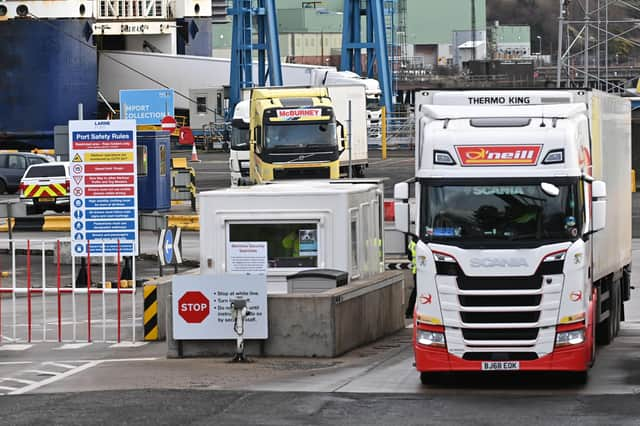Esmond Birnie: Why the Protocol status quo is not beneficial to Northern Ireland


Some of the protest has, predictably, come from the EU side. Past performance suggests they will continue to talk tough until the point at which they concede further “flexibilities”. The EU will, no doubt, threaten a trade war against the UK as a whole but is it really in the EU’s interest to have a trade war given that Northern Ireland (NI)-Republic of Ireland trade is so small in proportion to the scale of the EU Single Market?
Here in Northern Ireland and the UK, various commentators have tried to suggest the Protocol status quo is beneficial to NI. There are a number of weaknesses to such arguments:
Advertisement
Hide AdAdvertisement
Hide Ad(1) If the UK government had not introduced the various grace periods, we would be looking at full implementation of the Protocol and hence very severe economic dislocation;


(2) I wonder if business supporters of the status quo would wish to see the UK government end its current support measures which mitigate against the frictions imposed by the Protocol? The UK government has been spending more than £200m annually through schemes like the Trader Support Service. So, a lot of the costs of the Protocol to businesses are currently being disguised. I wonder if some of the businesses which say they have gained from the Protocol would be prepared to pick up some of that £200m tab?
(3) Any change to trade rules will produce winners and losers. The Protocol has done that so it isn’t surprising that some NI businesses can say they are now better off - but it is an entirely different matter whether NI overall is better off. The detailed economic forecasting by the Fraser of Allander Institute in November 2021 strongly suggests that in overall terms the Protocol will represent a substantial net cost to the NI economy. There has been particular focus on how the food processing sector in NI may have gained. The NI farming and food processing sector is an important economic sector but it is important to remember that it represents about 5% of total NI regional output. We should also be concerned about the remaining 95% of the NI economy;
(4) A few months ago various commentators claimed latest data showed the NI economy was out-growing the rest of the UK and it was also claimed this difference was a consequence of the Protocol. Well, the latest data from the Office for National Statistics, if it is reliable, “nowcasts” NI’s economic growth in January-March 2022 as only half the UK average.
Advertisement
Hide AdAdvertisement
Hide AdFrom an economic/business point of view there are two main things to consider in the Government’s Protocol legislation:
To what extent will the checks at the ports be reduced?
To what extent will the European Court of Justice (ECJ)’s ultimate jurisdiction over NI be removed or reduced. This second point is not simply a legal technicality - it very much plays into questions of how far various policy measures can actually be used in NI: VAT cuts, corporation tax changes, introduction of a freeport in Northern Ireland, and Northern Ireland’s inclusion in any UK international Free Trade Agreements.
• Dr Esmond Birnie, Senior Economist Ulster University Business School
See also